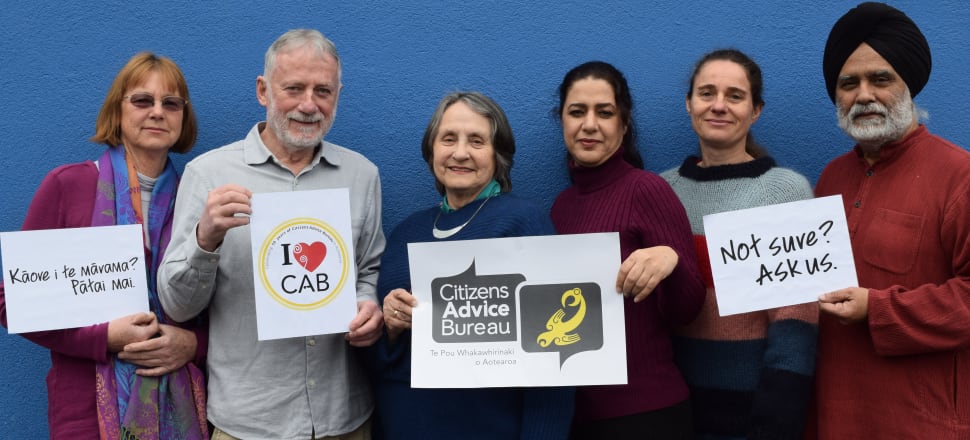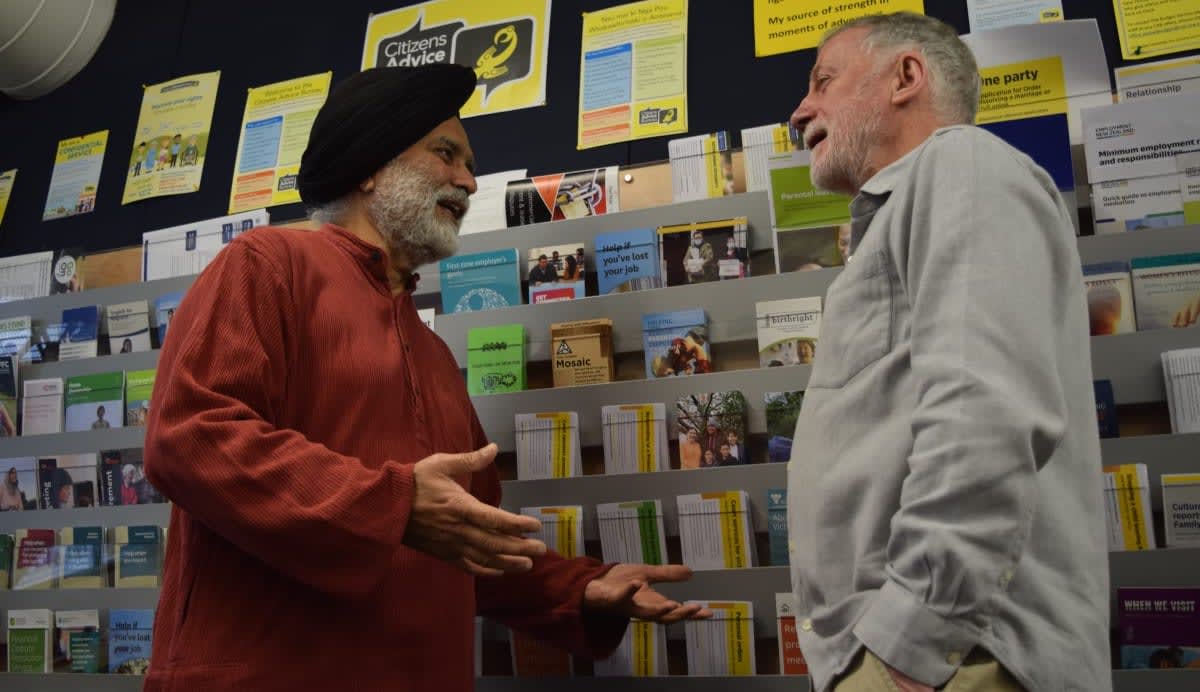
Wayne Brown’s draft Auckland budget 2023 proposes stopping or reducing funding to the city’s 32 CAB offices. Nearly 1000 volunteers are preparing for a fight.
When Auckland councillors meet next week to consider the 2023/2024 draft budget they may, or may not, ponder an “opportunity” presented in Appendix E on page 75: closing the Auckland Citizens Advice Bureau.
“Some or all of the following activities are proposed to be reduced, stopped or alternative funding sources found,” the ‘Staff advice to support mayoral proposal’ document says, naming CAB among other social, educational and arts programmes.
READ MORE: * Wayne’s first fix – a budget emergency * Auckland Mayor aims for 7 percent rates increase * Govt should pay rates to cash strapped councils * When rates don’t rate it: Incoming councillors seek bold revenue solutions
Budget cuts in this section could total $20 million; stopping funding to Citizens Advice Bureau would bring in $2m of that.
It’s something that horrifies Sylvia Hunt, a former business consultant, now the volunteer chair of ACABx, the liaison body between council and the 32 Auckland-based CABs.
Hunt started as a volunteer for CAB in Glen Innes, before joining the ACABx board and then being appointed chair last year.

She says the 880 or so volunteers throughout Auckland assisted 163,000 people last year, with a large part of the CAB’s role being helping people navigate bureaucracy and access their rights.
“Council aren’t thinking about the impact on communities if bureaux close. It might be someone who has had a terrible time with WINZ, they come in and they are angry and frustrated. We calm them down and sort out the problem.
“Or it might be people trying to deal with immigration and struggling to fill out forms online, or people who can’t access MyMSD. Or people trying to withdraw their KiwiSaver. People are trying to access things they are entitled to, but there are so many barriers, and there’s nowhere else for them to go.
“And if we don’t offer this help, what are the flow-on effects?”
The more services go online and face-to-face government services disappear, Hunt says, the harder it is for the most vulnerable in the community, particularly people without a good understanding of or access to the internet - the 'digitally excluded', in government speak.
Funding cut 'almost certain'
While stopping funding for Auckland CAB offices is only a proposal in Appendix E at this stage, Hunt says when she asked council staff what the likelihood was the cut would be approved, she was told it would “almost certainly” happen.
An Auckland Council spokesperson said its 'Service Prioritisation Framework' guided funding decisions and divided spending into four categories: ‘Must do’, ‘Should do’, ‘Could do’ and ‘Won’t do’.
"Activities... like the Citizens Advice Bureau primarily fall under the ‘Should do’ with some ‘Could do’ categories, as they are additional and improved services for communities over and above the services provided by central government and other agencies."
While the final decision on funding the CAB won't be made until June 29, Sylvia Hunt says the CAB is preparing for a fight, starting with the public consultation opening on February 28. “We are mobilising our forces and will make as many submissions as we can.”
Ironically, Citizens Advice Bureau thought the fight was already won – for the time being at least. In 2021, council agreed a funding plan that was to take the Auckland branch through to 2024, although the $2m a year allocation was subject to annual review.
“We thought it was a formality until 2024. Now they are cutting us off at the knees," Hunt says.
Between now and the start of public consultation at the end of February, councillors will go through the mayoral proposal in detail, including the CAB 'opportunity', and will agree a final document by February 15. The governing body workshop is next week.
Once feedback is in, councillors will consider it and the final budget decisions will be made on June 29, the spokesperson says.

Auckland Councillor Richard Hills told Newsroom the council is in an unenviable financial situation and has to make some tough decisions.
The organisation has $11.5 billion of debt, of which something like $4b is up for a big interest rate hike. Then there are staff costs going up 7-10 percent, and contract costs going up a similar amount. “We are trying to deal with inflation and also fund infrastructure quickly now that should have had funding years ago.”
Auckland Council's financial projections for the 2023/2024 year released in November suggested an operating budget gap of about $270 million, requiring “$180 million of additional operating budget mitigations for 2023/2024 over and above the $90 million previously signalled”.
One bone of contention for councils is much of the work of local CAB offices is helping people deal with the frustrations of central government-generated bureaucracy - immigration, Work and Income, housing, the courts, or police.
Wayne Brown, who took over as mayor in October, has committed to reducing expenditure as a way to keep rate increases down, and has put everything on the table - from the museum and art gallery to events such as Music in Parks and the Sustainable Schools programmes.
He has also mooted strategic asset sales, including Auckland Airport and/or Ports of Auckland.
Another option is getting more funding from central government, but that's an old fight councils have not won in the past.
Local v central government
Councillor Richard Hills would like to see central government look at funding the local, as well as the national operations of the Citizens Advice Bureau. One bone of contention for councils, and not just in Auckland, is much of the work of local CAB offices is helping people deal with the frustrations of central government-generated bureaucracy - immigration, Work and Income, housing, the courts, or police.
“There’s been discussion for some time about how much of CAB’s work is related to central government advocacy, and how government should be helping,” Hills says.

On the other side, government argues the work of the Citizens Advice Bureau fosters community wellbeing and that is the responsibility of councils under the 2019 Local Government (Community Well-being) Amendment Act.
Under the act, local authorities are responsible for improving the “social, economic, environmental and cultural wellbeing” of their communities.
"If Auckland Council cuts funding in June, the Citizens Advice Bureau service could end up closing by the end of the year." – ACABx chair Sylvia Hunt
Hills worries about the mayoral budget proposal, because it removes support from Citizens Advice Bureau offices without anything else being in place. He says councillors will be looking for Auckland staff to provide more detailed analysis in consultation documents this week, before they make a decision.
“The CABs was one of the things I asked about, because although it might look easy on paper to say 'central government or someone else will pick it up', if there’s a reduction in such a rapid way, how are CABs going to do what they do, employ who they employ?”
Sylvia Hunt says if Auckland Council cuts funding in June, the service could end up closing by the end of the year.
The history of the Citizen Advice Bureau
As much as anything, the present funding debacle (and it’s not the first time CABs in Auckland and elsewhere have fought for their existence) goes back to their historical roots.
The first CAB offices were set up in the UK in the days before World War II as places people could go to get help with all of the new war-time regulations.
As this video from the time shows, volunteers were trained to provide advice on anything from egg and soap rationing rules, to rent controls and accessing dependents’ allowances for the family members of soldiers.
Citizens Advice Bureaux in the UK were largely funded through local authorities, so when the idea was adopted in New Zealand in the 1970s, it followed a similar model.
The first office, opened in Ponsonby in 1970, was the brainchild of Peter Harwood, Auckland City’s Council’s first community advisor, and most of the more than 80 bureaux set up since then use council premises such as libraries and community centres, as well as local authority funding.
In the early days offices were often run by paid council staff.
The model is further complicated by the fact there is also a Wellington-based CAB head office structure, funded by central government. This provides, among other things, a database for volunteers to use, and information for government on needs in the community, using anonymised data from volunteer meetings with clients.

CABNZ chief executive Kerry Dalton says it’s disingenuous for Auckland Council to talk about alternative funding sources for the Auckland bureaux and then pull the plug without anything else being available.
She points to a report into the Wellington region service commissioned from PwC in 2018, when Wellington Council threatened similar funding cuts.
“WelCAB delivers a high value, low cost service ($9 per client interaction) and achieves a high return on investment (139 percent) through its workforce of volunteers,” the report said. “If WelCAB volunteers were paid staff members, they would cost an average of $687,964 per year.”
Dalton says it’s too early to say what action the Auckland CAB will take, but the Wellington volunteers and community support in 2018-2019 forced a change of heart at the council.
“Volunteers came out in force and fought, including attending council meetings when it was discussed. The public outrage was huge and as a result, council commissioned the PwC review,” she says. “It found we had a unique value proposition with people facing vulnerability and distress, and clearly said council was the appropriate funder.”
The 2018 PwC report recommended more central government funding for CABs to address digital exclusion, but this never materialised.
Fight for survival
Richard Hill agrees Citizens Advice Bureau needs to make its voice heard.
“Unfortunately, there’s a long list of things to fight for, but we have to show where the money is coming from. Do rates go up slightly to save funding for CABs?
“It’s about everyone who loves the Citizens Advice Bureau being loud and clear about the cuts and what it would look like in the community if it went. I would encourage people to submit.
Volunteers are, ironically, being asked to fight for the right to help people for free.
“But CAB also needs to find creative ways to get by with maybe less funding.”
Neither is easy, Sylvia Hunt says. She doesn’t get paid for the work she does chairing the Auckland CAB body, and it’s pretty much a full-time job at the moment, she says.
Meanwhile, the volunteers are, ironically, being asked to fight for the right to help people for free.
Hunt says she’s pessimistic when she looks at the draft budget and talks to council representatives. But she’s more optimistic when she thinks about the work the organisation does.
“If only council could just be sensible. We are already set up, we don’t take up much space really, and it costs $2 million to run us for a city the size of Auckland. Then there are all the other organisations that use our premises – community law, counselling and budgeting services, and the Family Court Navigator service which was set up by the Justice Department last year but has no funding for premises.
“There’s something called a social return on investment and we certainly provide that.”







